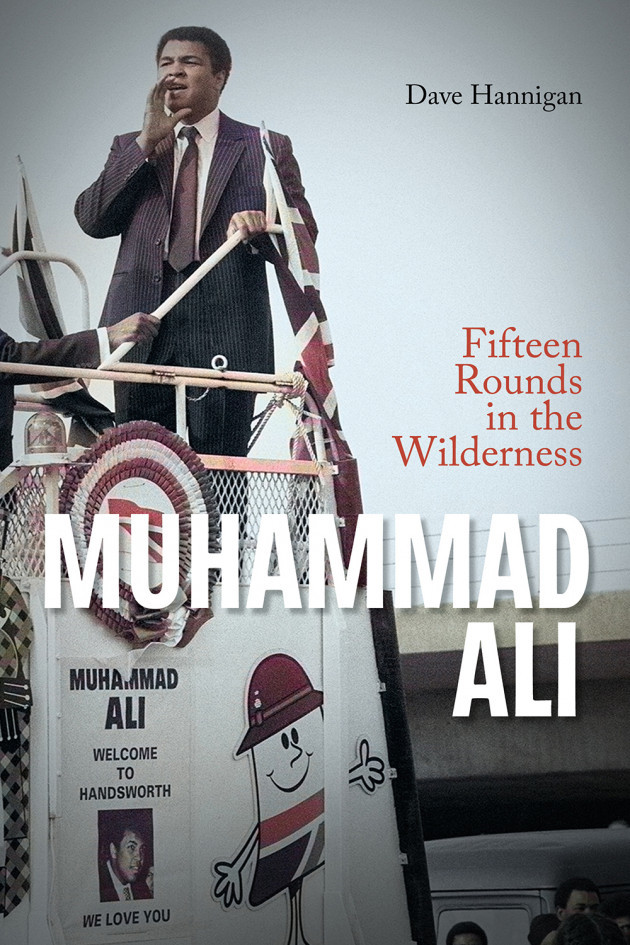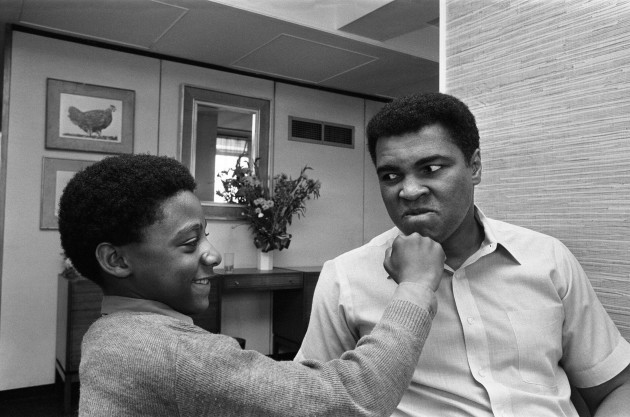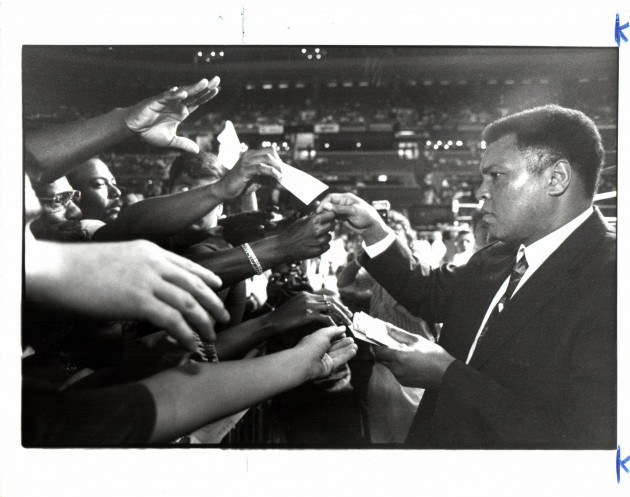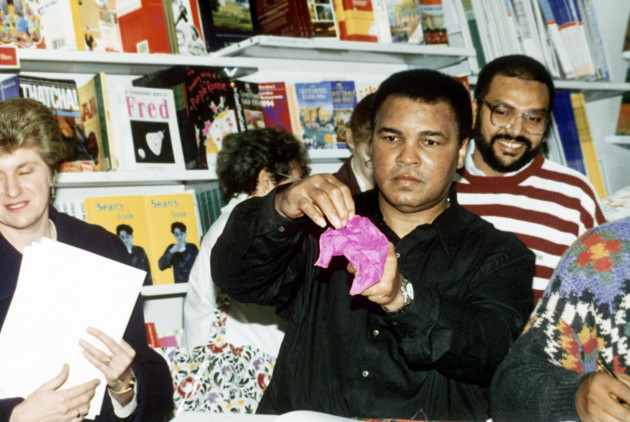STEVE EDEN CLIMBS through the ropes at the Five Seasons Centre in Cedar Rapids and sizes up his opponent. Eden, 27, was national Golden Gloves champion two years previously but the small crowd all have their eyes on the opposite corner, and the strange sight of Muhammad Ali decked out in suit trousers, dress shirt and boxing gloves.
The year is 1982, just a few months on from Ali’s last ever professional fight, but life already looks very different for ‘The Greatest’.
The two fighters trade a couple of harmless blows in a short exhibition bout before Ali signs some autographs and makes his way into the hotel, where he stretches a scheduled 60-minute magic show for a captivated audience of local children out to two and half hours.
The low-key ‘Ali Extravaganza’ had been a hastily-arranged affair put together to raise funds for a cultural centre for disadvantaged youth. On his way back to the airport that evening, Ali asks how the fundraising went. When told the event just about broke even, he rips up his expenses check.
This is one of countless examples of Ali’s extreme generosity and goodwill scattered throughout Dave Hannigan’s new book, ‘Muhammad Ali: Fifteen Rounds in the Wilderness’, which chronicles Ali’s life between his defeat by Trevor Berbick in December 1981 and lighting the Olympic flame in Atlanta in 1996.
The book is packed with heart-warming tales which show Ali’s caring side, but also proves a difficult read in places as the former fighter gets wrapped up in unsavoury associations and his Parkinson’s disease slowly begins to take an increasing hold over his life.
Yet the most striking aspect of the book is simply reading new snippets and anecdotes about arguably the most documented and celebrated star the sporting world has ever seen.
“I wrote a book a few years ago about Ali’s last fight called ‘Drama in the Bahamas’ and as I was researching that I could see some of the stuff that was happening in 1982 was, I wouldn’t say embarrassing, but not glamorous,” Hannigan explains.
The star was fading. I could see that life got a little bit tougher after the boxing ended, so I became fascinated by that era, that post-boxing 10-15 years. I thought it was kind of a neglected corner of the Ali story, and then the more I got into it, the more I realized there was a lot of stories in that period that people had never heard before.”
Initially, a man famed for his speed in the ring shows no sign of slowing down as a breathless itinerary carries him to every corner of the earth.
Some of those engagements are routine affairs – product launches and guest of honour appearances – but others see Ali place himself in remarkable situations. One of the more notable is his 1990 trip to Iraq, where in the early stages of the Gulf War, Ali defies the American government and goes on a solo run to Baghdad with the aim of using his celebrity and influence to convince Saddam Hussein to release American hostages back into his care. With the help of some local Irish nurses – who look after Ali when he runs out of his medication – he succeeds.
“What other athlete would go into what is really a warzone?” Hannigan says. “Those stories of epic risk that he undertakes are fantastic.
The travel log alone for these 15 years; North Korea, Cuba, Vietnam, South Africa as it’s coming to terms with life after apartheid and lots of violence – he places himself in the thick of these situations where history is unfolding. Lebanon in the mid-80s just after the founding of Hezbollah. It’s hard to see Tiger Woods or LeBron James or Lionel Messi turning up in these places.
“But I think what hopefully makes the book work is you’ll see one minute he’s doing that, and then he’s going into a prison to do magic tricks in the courtyard for the prisoners, the next he’s getting out of his car because he spots a group of kids on a street corner in South Bend, Indiana, and he gets out and starts sparring with them.
“All he wants is interaction with people, whether it’s the most famous or infamous people in the world, or just ordinary kids hanging around the street corner. He knows if he gets out of the car, he’s going to light up their lives and give them a memory of Muhammad Ali forever.”
Each passing year sees Ali sign thousands of autographs – often while dishing out religious pamphlets spreading the word of Islam – land playful soft-punches on hundreds of children, kiss every baby pressed into his arms and indulge star-struck fans with a growing repertoire of magic tricks. At one point, the British Magical Society even revoke his honorary membership having decided their star member is giving away too many secrets across various TV appearances.
But it’s not all glitz and glamour. Ali also runs foul of some seriously shady associates, a by-product of his inherit good nature and trust in people, as well as his obvious vulnerability, some of which result in him testifying in court.
“He was very trusting, very loyal. If you became his friend your stayed his friend no matter what. He’s very vulnerable to exploitation, especially in the first half of the book.
“There’s four dastardly characters in the book. There’s this dodgy Sheikh, Sheikh al-Fassi. There’s a sinister, sinister doctor from the old Yugoslavia, Dr. Rajko Medenica, who’s promising to clean his blood, who says he doesn’t have Parkinson’s at all, that he’s got an infection from pesticides. Then there’s Richard Hirschfeld, this white-collar lawyer who is a complete and utter gangster, and there’s Arthur Morrison, a street hustler, who was trying to put Ali’s name on everything to make money out of it.
“His name really was being exploited and diminished by some of these people, but he remained loyal to them. Throughout the book, you’re wishing he had better people around him and he was more insulated, in a way like modern athletes seem to be more protected from this kind of stuff.”
The 15-year window also closely charts Ali’s difficult battle with Parkinson’s disease. Initially reluctant to admit he is struggling, Ali slowly begins to accept his diagnosis but in places, finds it difficult to face up to his declining health.
At one point in 1991, he fears fans will be “embarrassed” by his apperance on an episode of NBC’s Today show, confiding with his family that he is “shaking too much” as he watches back a taping of the episode.
While still boisterous and full of life in the early chapters of the book, Ali becomes a shell of the man who once shook up the world. In some public appearances he struggles to speak or even eat from his own plate.
He is a little bit in denial early on. In the mid-80s, he’s still chasing wacky medical cures. There’s a desperation, and he’s vulnerable to miracle cure suggestions for a while, but then he does gradually come to terms with his condition.
“The mouth that roared basically becomes the mouth that whispers and he barely speaks at all in someone encounters, but he still touches people.
Very often, he says very little but he just invites people to accompany him. You could be in a hotel lobby and suddenly find yourself bringing his bags up to his room. Two college kids wander into his orbit in a hotel, and they end up sitting in a room watching basketball with him. He invites people into his inner sanctum, and he’s very conscious that they leave then with this, ‘I touch the star so I twinkle too’ sort of mindset after spending some time with him.
“And he loved it too. My take away from it is the adulation and the recognition and the interaction with the ordinary people, that was vital to him; that was oxygen for him even as his physical decline developed.
“It’s worth also pointing out the tremendous courage as your body wanes physically and as your powers diminish, he’s still willing to put himself out there in public knowing people would be saddened or shocked by his debilitation. I think that’s one more instance of how brave and courageous a character he was.”
Even as his physical condition wanes, Ali’s endearing charm and presence remain intact. If anything, as Parkinson’s takes over, the moments where Ali’s personality comes to the fore become increasingly powerful. There are times where a quick flash of the old Ali wit, or even just his presence, produce extreme reactions.
There’s a poignant moment in 1992 where Ali stops outside a bookstore in Nottingham to console a woman who cries upon seeing his diminished condition.
“Don’t feel bad,” Ali tells the woman, planting a kiss on her cheek. “God has blessed me. I’ve had a good life, and it’s still good.” She leaves the encounter with a smile on her face.
Regardless of how jaded or weary Ali finds himself, that’s something he does throughout the book – put smiles on faces.
On that same UK trip, Ali makes his entourage take an impromptu detour between engagements to visit the council house home of Paddy Monaghan, president of his UK fan club, upon hearing the Fermanagh native’s mother recently passed away.
“He has a massive ego yet is incredibly humble,” Hannigan adds.
“He’s a mess of contradictions, but he does want to touch people wherever he goes and leave a mark on every place that he visits.
“It’s sad, but I hope it’s funny too because there are places where he is very, very funny, still coming out with one-liners, especially with kids.
“Even when he goes to see a play where Geoffrey Ewing is playing Ali. He meets Ewing and his girlfriend in the dressing room afterwards and jokes to the girl, ‘You know, you can come home with me, I’m the real thing’.
“There’s still some of the old rogue left in him, even towards the end when he’s not quite the man he used to be.”
‘Muhammad Ali: Fifteen Rounds in the Wilderness’ by Dave Hannigan, published by Pitch Publishing Ltd, is out now.
The42 is on Instagram! Tap the button below on your phone to follow us!





